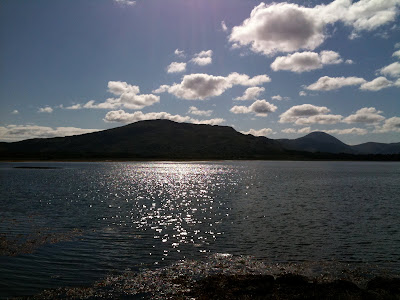
The man I met on the ferry from Lerwick had a job ahead of him to find the owner of the
little diamond ring he'd found amongst the rubbish on the beach at Yell. I had my own ring mystery to solve, but I didn't tell him that at the time.
My older sister had a ring which my mother bought her, silver tubes filled with pink and purple perspex that glowed under neon lights and could be worn in two directions. She was my older sister and everything she had, I wanted to have too, because she was what I believed to be the benchmark of hip. When I was working at Lonely Planet, I took my first pay packet and bought a ring by the same designer from a jewelry shop in Brick Lane. I think I was 20 and it cost me £60.
Roll on a decade and that ring has been all over the world with me. Of all the lovely bits of silver I own, left to me by grandmothers and some even made by my grandmother, it's the one piece that people comment on. It's unusual maybe because what looks like precious jewels is in fact perspex, set in a heavy block of silver which never seems to dull. It is smooth and angular at the same time. It is beautiful to wear because it is soft on the skin but also extremely heavy. It suits the wide knuckles that I inherited from my Granny Wendy.
Recently I started to hanker after another piece of jewelry by this same designer. I went back to the shop in Brick Lane and showed the lady the ring. She said she didn't know who had made it and had nothing like it any more. More recently I went to another shop near my office and the woman also didn't recognise it. She got out her magnifying glass and looked at the hallmark, now almost completely worn away. "W.B" she said it said, squinting at the underbelly of my ring. "Try Google."
With a day-rate pay under my wings I spent the afternoon Googling 'W.P Perspex Jewelry' and every other permutation of those bare facts. Nothing much came up and I forgot about it for a while.
On Sunday morning I was rushing out to my studio to open up my exhibition when I stopped and carefully put on my ring. Before I got to the studio, I stopped in at a furniture-maker's studio in the next-door yard to say hello. He was listening to Ali Farka Toure on the radio and working away at a beautiful wooden chair which I stopped to touch. We chatted and as I was about to leave he pointed at my ring and said,
"You have a William Prophet."
I stopped cold because of course then I remembered his name as clear as anything. W.P., not W.B.
Ian showed me his own wedding ring, made by W.P.
"He's a friend of mine. He runs a pub now round the corner."
The pub is on my cycle route so yesterday, on my way to town, I dropped by. Everyone stared at me as I went in; only Kennington locals drink in this little hole with its navy blue patterned carpet and game machine flashing in the corner. I went to the bar and said I was looking for William.
A man came over and I told him I had one of his rings, showing him my hand.
"Oh right," he said, looking suspicious. "What's wrong with it?"
"Nothing!" I told him, and started to tell him how I had looked for the designer of this ring for some time.
He smiled and looked pleased. But said, "What do you want?" as if I had come to ask for my money back.
"I want to buy another one," I said.
"Oh," he said, then started to tell me in gushes of speech everything around the subject of how he came to be running a pub.
"I thought it'd be a hobby and then I could crack on with the jewelry," he said. "But I've had commissions for a year that I haven't been able to get down to."
He gave me his phone number and told me to come back; he'd dig out what he had upstairs.
He asked me if I came on my bike.
"I could tell by the sweat," he said.





